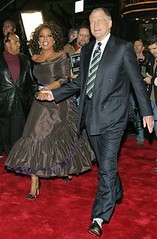The New York Times
December 4, 2005
Op-Ed Columnist
All the President's Flacks
By FRANK RICHWHEN "all of the facts come out in this case," Bob Woodward told Terry Gross on NPR in July, "it's going to be laughable because the consequences are not that great."
Who's laughing now?
Why Mr. Woodward took more than two years to tell his editor that he had his own personal Deep Throat in the Wilson affair is a mystery best tackled by combatants in the Washington Post newsroom. (Been there, done that here at The Times.) Mr. Woodward says he wanted to avoid a subpoena, but he first learned that Joseph Wilson's wife was in the C.I.A. in mid-June 2003, more than six months before Patrick Fitzgerald or subpoenas entered the picture. Never mind. Far more disturbing is Mr. Woodward's utter failure to recognize the import of the story that fell into his lap so long ago.
The reporter who with Carl Bernstein turned a "third-rate burglary" into a key for unlocking the true character of the Nixon White House still can't quite believe that a Washington leak story unworthy of his attention has somehow become the drip-drip-drip exposing the debacle of Iraq. "I don't know how this is about the buildup to the war, the Valerie Plame Wilson issue," he said on "Larry King Live" on the eve of the Scooter Libby indictment. Everyone else does. Largely because of the revelations prompted by the marathon Fitzgerald investigation, a majority of Americans now believe that the Bush administration deliberately misled the country into war. The case's consequences for journalism have been nearly as traumatic, and not just because of the subpoenas. The Wilson story has ruthlessly exposed the credulousness with which most (though not all) of the press bought and disseminated the White House line that any delay in invading Iraq would bring nuclear Armageddon.
"W.M.D. - I got it totally wrong," Judy Miller said, with no exaggeration, before leaving The Times. The Woodward affair, for all its superficial similarities to the Miller drama, offers an even wider window onto the White House flimflams and the press's role in enabling them. Mr. Woodward knows more about the internal workings of this presidency than any other reporter. He has been granted access to all its top officials, including lengthy interviews with the president himself, to produce two Bush best sellers since 9/11. But he was gamed anyway by the White House, which exploited his special stature to the fullest for its own propagandistic ends.
Mr. Woodward, to his credit, is not guilty of hyping Saddam's W.M.D.'s. And his books did contain valuable news: of the Wolfowitz axis' early push to take on Iraq, of the president's messianic view of himself as God's chosen warrior, of the Powell-Rumsfeld conflicts that led to the war's catastrophic execution. Yet to reread these Woodward books today, especially the second, the 2004 "Plan of Attack," is to understand just how slickly his lofty sources deflected him from the big picture, of which the Wilson case is just one small, if illuminating, piece.
In her famous takedown of Mr. Woodward for The New York Review of Books in 1996, Joan Didion wrote that what he "chooses to leave unrecorded, or what he apparently does not think to elicit, is in many ways more instructive than what he commits to paper." She was referring to his account of Hillary Clinton's health care fiasco in his book "The Agenda," but her words also fit his account of the path to war in Iraq. This time, however, there is much more at stake than there was in Hillarycare.
What remains unrecorded in "Plan of Attack" is any inkling of the disinformation campaign built to gin up this war. While Mr. Woodward tells us about the controversial posturing of Douglas Feith, the former under secretary of defense for policy, there's only an incidental, even dismissive allusion to Mr. Feith's Policy Counterterrorism Evaluation Group. That was the secret intelligence unit established at the Pentagon to "prove" Iraq-Qaeda connections, which Vice President Dick Cheney then would trumpet in arenas like "Meet the Press." Mr. Woodward mentions in passing the White House Iraq Group, convened to market the war, but ignores the direct correlation between WHIG's inception and the accelerating hysteria in the Bush-Cheney-Rice warnings about Saddam's impending mushroom clouds in the late summer and fall of 2002. This story was broken by Barton Gellman and Walter Pincus in Mr. Woodward's own paper eight months before "Plan of Attack" was published.
Near the book's end, Mr. Woodward writes of some "troubling" tips from three sources "that the intelligence on W.M.D. was not as conclusive as the C.I.A. and the administration had suggested" and of how he helped push a Pincus story saying much the same into print just before the invasion. (It appeared on Page 17.) But Mr. Woodward never seriously investigates others' suspicions that the White House might have deliberately suppressed or ignored evidence that would contradict George Tenet's "slam-dunk" case for Saddam's W.M.D.'s. "Plan of Attack" gives greatest weight instead to the White House spin that any hyped intelligence was an innocent error or solely the result of the ineptitude of Mr. Tenet and the C.I.A.
Dick Cheney and Scooter Libby are omnipresent in the narrative, and Mr. Woodward says now that his notes show he had questions for them back then about "yellowcake" uranium and "Joe Wilson's wife." But the leak case - indeed Valerie Wilson herself - is never mentioned in the 400-plus pages, even though it had exploded more than six months before he completed the book. That's the most damning omission of all and suggests the real motive for his failure to share what he did know about this case with either his editor or his readers. If you assume, as Mr. Woodward apparently did against mounting evidence to the contrary, that the White House acted in good faith when purveying its claims of imminent doomsday and pre-9/11 Qaeda-Saddam collaborations, then there's no White House wrongdoing that needs to be covered up. So why would anyone in the administration try to do something nasty to silence a whistle-blower like Joseph Wilson? The West Wing was merely gossiping idly about the guy, Mr. Woodward now says, in perhaps an unconscious echo of the Karl Rove defense strategy.
Joan Didion was among the first to point out that Mr. Woodward's passive notion of journalistic neutrality is easily manipulated by his sources. He flatters those who give him the most access by upholding their version of events. Hence Mary Matalin, the former Cheney flack who helped shape WHIG's war propaganda, rushed to defend Mr. Woodward last week. Asked by Howard Kurtz of The Post why "an administration not known for being fond of the press put so much effort into cooperating with Woodward," Ms. Matalin responded that he does "an extraordinary job" and that "it's in the White House's interest to have a neutral source writing the history of the way Bush makes decisions." You bet it is. Sounds as if she's read Didion as well as Machiavelli.
In an analysis of Mr. Woodward written for The Huffington Post, Nora Ephron likens him to Theodore H. White, who invented the modern "inside" Washington book with "The Making of the President 1960." White eventually became such an insider himself that in "The Making of the President 1972," he missed Watergate, the story broken under his (and much of the press's) nose by Woodward and Bernstein. "They were outsiders," Ms. Ephron writes of those then-lowly beat reporters, "and their lack of top-level access was probably their greatest asset."
INDEED it's reporters who didn't have top-level access to the likes of Mr. Bush and Mr. Cheney who have gotten the Iraq story right. In the new book "Feet to the Fire: The Media After 9/11," Kristina Borjesson interviews some of them, including Jonathan Landay of Knight Ridder, who heard early on from a low-level source that "the vice president is lying" and produced a story headlined "Lack of Hard Evidence of Iraqi Weapons Worries Top U.S. Officials" on Sept. 6, 2002. That was two days before administration officials fanned out on the Sunday-morning talk shows to point ominously at the now-discredited front-page Times story about Saddam's aluminum tubes. Warren Strobel, a frequent reportorial collaborator with Mr. Landay at Knight Ridder, tells Ms. Borjesson, "The most surprising thing to us was we had the field to ourselves for so long in terms of writing stuff that was critical or questioning the administration's case for war."
Such critical stories - including those at The Post and The Times that were too often relegated to Page 17 - did not get traction until the failure to find W.M.D.'s and the Wilson affair made America take a second look. Now that the country has awakened to that history, it will take more to shock it than the latest revelation that the Defense Department has been paying Iraqi newspapers to print its propaganda. Thanks in large part to the case Mr. Woodward found so inconsequential, everyone knows that much of the American press did just the same before the war - and, unlike those Iraqi newspapers or, say, Armstrong Williams, did so gratis.
 Hey guys...
Hey guys...








